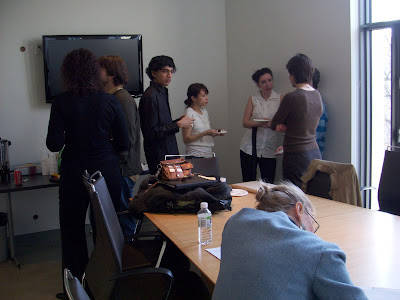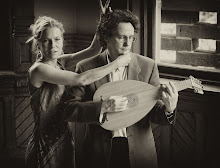Here's a snap from last week's concert. It was great fun.

And here's the program:
Fair cruell nymph Alfonso Ferrabosco II (1572-1628)
❀
Songs on Flowers
Go lovely rose William Lawes (1602-45)
To Pansies - Ah! cruel love W. Lawes
On the Marigold - Mark how the blushful morn Henry Lawes (1596-1662)
On the Lillys - White though ye be W. Lawes
To the Sicamour - I’m sick of Love Nicholas Lanier (1588-1666)
Gather ye rosebuds W. Lawes
❀
Loves Constancy - No more may meads Lanier
Now in the sad declension of our time W. Lawes
Be not proud pretty one W. Lawes
❀
Hero’s Complaint to Leander Lanier
❀
Coranto René Saman (fl 1610-31)
Coranto (Jacques?) Gaultier (fl.1617-60)
Intermission
Songs from Plays
Tell me dearest Robert Johnson (1582-1633)
So beautie on the waters stood - Had those that dwell in error - If all the ages of the earth Ferrabosco
The Cutpurse Song - I keep my horse W. Lawes
Care charming sleep Johnson
Full fathom five - Where the bee sucks Johnson
❀
Fuggi fuggi fuggi Anon.
Tavola - In quel gelato core H. Lawes
❀
Pavan Johnson
❀
Woe’s me! Alas Robert Ramsey (fl. 1612-1644)
Darryl Edwards, tenor, has appeared to critical acclaim in oratorio, recital, and opera in England, Germany, France, Italy, Corsica, the United States, and across Canada. His recent and upcoming engagements include Kodály's Psalmus Hungaricus with the National Arts Centre Orchestra in Ottawa, the Verdi Requiem at Dalhousie University, Orff's Carmina Burana with the Toronto Mendelssohn Choir, Mozart Requiem with the Toronto Philharmonia, and Handel's Messiah with the Elmer Iseler Singers. Critics praise him as a ‘rich-voiced, cultured tenor who mastered the high notes effortlessly’ (Coburg Tageblatt, Germany), and an ‘effective communicator who expressed the text with sensitivity and fervour’ (Hamilton Spectator). His recordings and broadcasts include performances with National Public Radio, the Canadian Broadcasting Corporation and the Canadian Music Centre (Centrediscs). He is the Artistic Director of the Centre for Opera in Sulmona, Italy and the Concert Opera Group.
Named after the singers and lutenists who performed in the most intimate quarters of the Stuart monarchs’ palace,
The Musicians In Ordinary for the Lutes and Voices dedicate themselves to the performance of early solo song and vocal chamber music. Soprano Hallie Fishel and lutenist John Edwards have been described as ‘winning performers of winning music’. Now in their seventh season of concerts in Toronto, they perform across North America and lecture regularly at universities and museums. Institutions where MIO have performed include the Canadian Society for Renaissance Studies, Grinnell College, the Universities of Alberta and Toronto, the Kingston Opera Guild, Trent and York Universities and the Bata Shoe Museum. They have been Ensemble in Residence at Lafayette College in Easton, Pennsylvania. Their debut CD of Elizabethan and Jacobean songs, Sleep Wayward Thoughts, is available at intermission.
Fair, Cruel Nymph‘Wilson! There’s more words, let’s hear them all.’ King Charles I so ordered the singer John Wilson during a performance. This not only shows that the King was paying attention, but that he appreciated the disservice that Wilson was doing to the poet by leaving verses unsung.
And the delivery of the poetry had become the most important aspect of songwriting as England imported the new Italian Baroque style at the beginning of the 17th century. The complicated polyphony that the lute song composers of the John Dowland generation was gone, replaced by a bass from which the lutenist improvised chords. For this new style the English also imported the theorbo, a lute that had been invented by the Italians to provide a big bass sound. Inigo Jones, architect and designer of the sets for the court masque, is supposed to have imported the first theorbo. According to a contemporary diarist the weird instrument’s owner was interrogated by the authorities, who thought it might be ‘a machine brought from popish countries to destroy the king’. Indeed, Italian fashions dominated the vocal music of the post-Dowland generation so much that Henry Lawes set the table of contents from an Italian songbook to mock those who sang in Italian without understanding what they were singing.
The English Civil War stopped the slide to absolutism that became the political hallmark of 17th century France. If it hadn’t who’s to say that the heroic declamation of the masque, where the aristocrats assured themselves that they were rightly at the head of the body politic, and even that James’s Queen Anne was greater than Elizabeth, would not have combined with the drama of dialogues like Woe’s me to become court opera like that cultivated by Louis XIV and Lully? It’s moot though; The English were not going to stand for a despot, however benevolent, and the masque, baroque court music and the tradition of the Shakesperean theatre were all cut off by the Commonwealth. Perhaps the theorbo, which was used in these genres, did contribute to the destruction of King Charles, then.
 Hallie fills out the release form for our picture being taken.
Hallie fills out the release form for our picture being taken. Snacks at the reception afterwards.
Snacks at the reception afterwards. But the real reason we wanted to go to Scarborough, St. Andrew's Scottish fish and chips shop on McCowan and Ellesmere. That's deep fried mealy pudding in the top left of my plate.
But the real reason we wanted to go to Scarborough, St. Andrew's Scottish fish and chips shop on McCowan and Ellesmere. That's deep fried mealy pudding in the top left of my plate.


